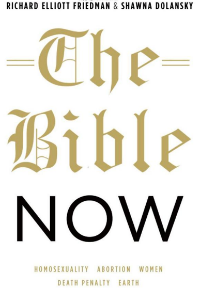The Bible Now
Friedman and Dolansky discuss five thorny issues: homosexuality, abortion, the position of women, the death penalty and The Earth (environmental issues). On each they bring the Hebrew Bible to word and they listen to American scholars.
The Bible Now
By Richard Elliot Friedman and Shawna Dolansky
Oxford University Press: 220pp., £16.99
ISBN: 9780195311631
Reviewer: Pieter Lalleman
This book is likely to mislead you in several ways. It only deals with the Old Testament, not with the entire Bible.

Published by Oxford University Press, it is thoroughly American. Its title might suggest that readers will find clear answers to contemporary issues, but at the end of each chapter the authors basically suggest that readers make up their own minds. There are no questions for home groups or the like, but solid endnotes and indexes facilitate further study. For the authors the Bible is not authoritative but merely one of the sources of information - and a great piece of literature. The Holy Spirit is never mentioned.
Their main thesis is that the Bible is too difficult for lay people to understand and requires the guidance of scholars: “The texts about these things are not to be explained by people who cannot read them unless someone else does translations for them. Do not let unskilled, untrained people cut your hair, fix your car, treat your illnesses, invest your savings, defend you in court, or tell you what the Bible means.” (177)
Baptist Christians have always believed that individuals and churches meeting in the name of Christ can do exactly this: read, discuss, understand and apply the Scriptures. There is a growing awareness that theology is a useful guide in doing so, but we don’t agree with the approach taken in this book. The book itself requires that readers hold a good degree because it is not easy.
Friedman and Dolansky discuss five thorny issues: homosexuality, abortion, the position of women, the death penalty and The Earth (environmental issues). On each they bring the Hebrew Bible to word and they listen to American scholars. With regard to homosexuality, they emphasise that lesbian sexual practice is not forbidden in the Hebrew Bible, only male homosexuality. Abortion is not mentioned in the Bible, they say. On women their conclusion is: “In the Bible’s picture, women are created with equal worth to men, but men come to have superior status to them through a variety of mechanisms. … The Bible opens various doors that point to an eventual return to balance between women and men.” (125) They don’t rule out capital punishment.
This book can help ministers and other leaders in the preparation of teaching and preaching, but there are many better sources around.
The Revd Dr Pieter Lalleman is Acadamic Dean and Tutor of New Testament at Spurgeon's College